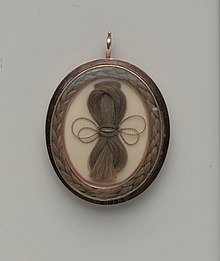
Hairwork, or jewelry or artwork made of human hair, has appeared throughout the history of craft work, particularly to be used for private worship or mourning. From the Middle Ages through the early twentieth century, memorial hair jewelry remained common. Hair, considered to be a remnant off the person it was cut from, also has often played a part in myths and legends; in a Swedish book of proverbs, one can read that “rings and bracelets of hair increase love” (Vadstena stads tankebok).[1] One example can be found in Denmark, at Rosensborg’s palace, which is a bracelet of precious metal with a simple braided lock of hair - a gift from King Christian IV (1577-1648) to his queen. Another example would be the rings commemorating the execution of King Charles I of England (1600-1649), which circulated among his faithful supporters. Other famous people who owned hair jewelry include Napoleon, Admiral Nelson, Queen Victoria and her large family, Christina Nilsson and Jenny Lind.


- ^ Sherrow, Victoria (2006). Encyclopedia of Hair: A Cultural History. Westport: Greenwood Press.